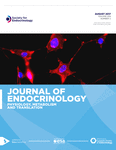Gastrin induces ductal cell dedifferentiation and β-cell neogenesis after 90% pancreatectomy
- Noèlia Téllez1,2,4⇑ and
- Eduard Montanya1,2,3,4
- 1CIBER of Diabetes and Metabolic Diseases, CIBERDEM, Barcelona, Spain
2Bellvitge Biomedical Research Institute, IDIBELL, L'Hospitalet de Llobregat, Barcelona, Spain
3Endocrine Unit, Hospital Universitari de Bellvitge, L'Hospitalet de Llobregat, Barcelona, Spain
4Department of Clinical Sciences, University of Barcelona, L'Hospitalet de Llobregat, Barcelona, Spain
- Correspondence should be addressed to N Téllez; Email: ntellez{at}ub.edu
Abstract
Induction of β-cell mass regeneration is a potentially curative treatment for diabetes. We have recently found that long-term gastrin treatment results in improved metabolic control and β-cell mass expansion in 95% pancreatectomised (Px) rats. In this study, we investigated the underlying mechanisms of gastrin-induced β-cell mass expansion after Px. After 90%-Px, rats were treated with gastrin (Px+G) or vehicle (Px+V), pancreatic remnants were harvested on days 1, 3, 5, 7, and 14 and used for gene expression, protein immunolocalisation and morphometric analyses. Gastrin- and vehicle-treated Px rats showed similar blood glucose levels throughout the study. Initially, after Px, focal areas of regeneration, showing mesenchymal cells surrounding ductal structures that expressed the cholecystokinin B receptor, were identified. These focal areas of regeneration were similar in size and cell composition in the Px+G and Px+V groups. However, in the Px+G group, the ductal structures showed lower levels of keratin 20 and β-catenin (indicative of duct dedifferentiation) and higher levels of expression of neurogenin 3 and NKX6-1 (indicative of endocrine progenitor phenotype), as compared with Px+V rats. In Px+G rats, β-cell mass and the number of scattered β-cells were significantly increased compared with Px+V rats, whereas β-cell replication and apoptosis were similar in the two groups. These results indicate that gastrin treatment-enhanced dedifferentiation and reprogramming of regenerative ductal cells in Px rats, increased β-cell neogenesis and fostered β-cell mass expansion.
- Received in final form 23 July 2014
- Accepted 12 August 2014
- Made available online as an Accepted Preprint 13 August 2014
- © 2014 Society for Endocrinology











